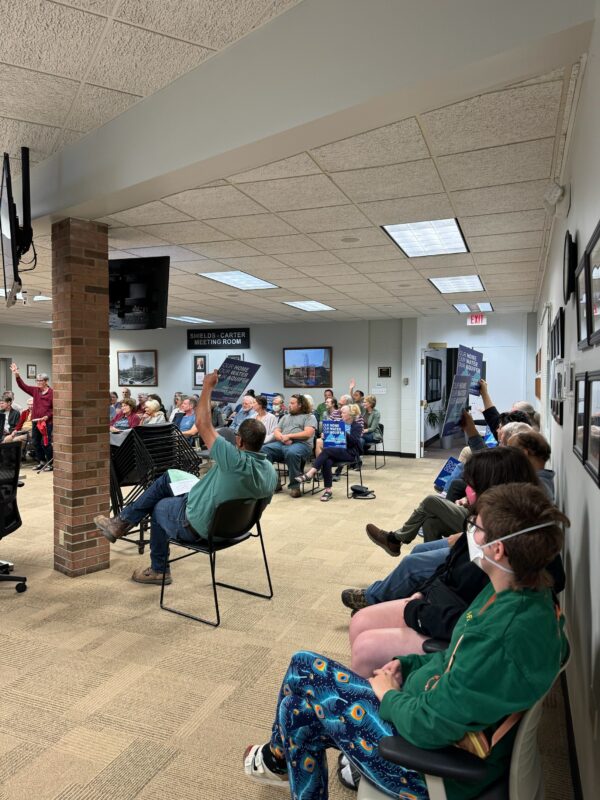URBANA, Ill. – The Champaign County Board initiated the process to implement a 12-month moratorium on carbon sequestration activities under the Mahomet Aquifer and its recharge areas on Thursday.
The county board’s Environment and Land Use Committee voted unanimously on Thursday to move forward with the process in front of a standing room-only crowd of more than 70 people. The moratorium would provide the County the necessary time to consider zoning amendments that could prohibit CCS projects posing a risk to the aquifer, which supplies clean drinking water to nearly one million people across Central Illinois.
The proposed moratorium follows growing concerns over carbon sequestration technology after two recent leaks at Archer Daniels Midland’s CCS facility, located just five miles from the Mahomet Aquifer near Decatur. During this moratorium period, Champaign County would evaluate potential zoning regulations to better protect this vital water source from the risks of carbon dioxide pollution and heavy metal contamination.

“The Mahomet Aquifer is irreplaceable, and we cannot afford to take chances with technologies that could put our water at risk,” said Andrew Rehn, Director of Climate Policy at Prairie Rivers Network. “This is an important step for protecting the health and safety of our water, and we’d need to see other counties and the state follow Champaign County’s lead to protect the aquifer”
The timeline for the moratorium includes several key dates for public hearings and decision-making. The Champaign County Zoning Board of Appeals (CCZBA) will begin its public hearing on Thursday, December 12, 2024, and is expected to make recommendations to the County Board by January 16, 2025. Final action is expected by February 20, 2025, when the full County Board will vote on the matter.
Neighboring counties, including Dewitt County, have already taken strong actions to ban carbon sequestration projects under the Mahomet Aquifer, and Ford County is considering similar measures. Advocates for the moratorium, including the Protect the Mahomet Aquifer coalition, argue that the risks posed by CCS to the aquifer are too high to ignore.
“We’re thankful to the Champaign County Board for taking this measure to protect our public health. When CO2 is injected underground, it can mix with water to form carbonic acid, which in turn can leach dangerous heavy metals like uranium, nickel, and manganese into the water supply,” said Pam Richart, Co-Director of Eco-Justice Collaborative. “This moratorium gives us a chance to create meaningful protections before any lasting damage is done.”
The decision comes at a critical time, with state lawmakers also considering legislation to ban carbon sequestration projects over, under, or through sole-source aquifers like the Mahomet. State Senator Paul Faraci (D-Champaign) and State Representative Carol Ammons (D-Urbana) have both introduced bills to ensure these activities won’t jeopardize this crucial water source, with discussions expected during the upcoming veto session. SB3968 and HB5874 address the regulatory gap in the CCS Protections bill signed by the Governor in July. SB1289 did not include the hoped for protections for the Mahomet Aquifer.
“My community, as well as many surrounding areas, depend on the Mahomet Aquifer to provide clean drinking water, support our agriculture and sustain industrial operations,” said State Senator Paul Faraci (D-Champaign). “Protecting the health and livelihood of our residents and industries that rely on the aquifer must remain our top priority. That’s why I’ve introduced new legislation to ensure CCS activities won’t jeopardize this crucial resource.”
“The two recent leaks from carbon capture facilities in central Illinois remind us of how dangerous it would be to have these operations anywhere near our drinking water,” said State Rep. Carol Ammons (D-Urbana). “When it comes to the Mahomet Aquifer, the sole source of clean water for nearly one million people, I have no tolerance for risk. I wrote House Bill 5874 to protect our aquifer by banning those projects from running anywhere near our water.”
Both the cities of Champaign and Urbana rely on the Mahomet Aquifer for their drinking water, and the mayors of both cities applauded the board’s decision.
“For me, the answer is as clear as the water we drink.” said Urbana Mayor Diane Marlin, who spoke at the meeting. “We must protect the quality and quantity of water in our sole source aquifer. I support a ban on carbon sequestration projects through, and under, the Mahomet Aquifer.”
“Protecting the Mahomet Aquifer, our sole source of drinking water, is of the utmost importance and urgent action is necessary to do so,” said Champaign Mayor Deborah Frank Feinen. “I am pleased that the County is taking action to ban CCS in and through the Aquifer, and I appreciate our local legislators acting quickly to file legislation doing the same.”
About Protect the Mahomet Aquifer
The Protect the Mahomet Aquifer campaign is a coalition of community members, environmental organizations, and advocacy groups united to protect the Mahomet Aquifer — a vital water source for nearly one million people across 14 counties in Central Illinois. In response to the growing threat of carbon capture and sequestration projects proposed under the aquifer and its recharge areas, residents have mobilized to demand action. The campaign, led by Eco-Justice Collaborative, Illinois People’s Action, Prairie Rivers Network, the Sierra Club’s Prairie Group Chapter and concerned citizens, is calling for a legislative ban on CCS projects that risk contaminating this critical water source.







